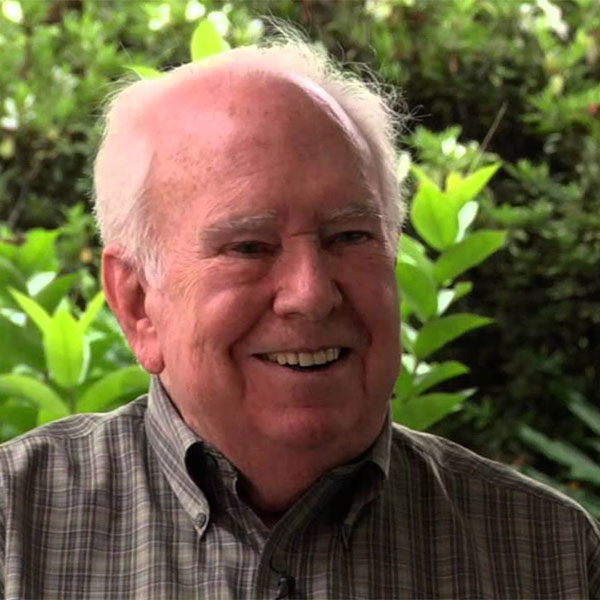Q&A with Peter Raven “The Planet´s Hero”

Peter H. Raven is a botanical giant. He was described by Time Magazine as a “Hero for the Planet” for his environmental work and biodiversity conservation. Not only has he earned prestigious prizes, but he actually has a prize named after him: the Peter Raven Award of Plant Taxonomy, granted by the American Society of Plant Taxonomists. Raven was a member of Bill Clinton’s Council of Advisors on Science and Technology, he is a member of science academies in Russia, Sweden, the U.K, China, Denmark, India, Brazil, Argentina, Italy, Mexico, among others and was secretary of the U.S. National Academy of Science for 12 years.
Recently, Peter devoted some of his time to share his opinions on science in Latin America, Yachay Tech as a project, and the planet´s biodiversity.
Yachay Tech (YT): How do Biotechnology and Biodiversity complement each other?
Peter Raven (PR): Biotechnology contributes deeply to biodiversity conservation through the generation of instruments that allow us to optimize the use of natural resources and reduce the environmental impact that humans have on these resources.
Biodiversity is proof of the condition of the environment, so if we lose biodiversity we lose life, valuable for the balance of ecosystems.
Ecuador has lost a good part of its natural vegetation, especially in the west. This is a serious problem for the world since Ecuador is home to many unique animal and plant species. Preserving them is important for the future of Ecuador, not only in economic terms, but also in terms of guaranteeing Ecosystem Services: controlling floods, maintaining fertile soils, and absorbing pollution. Ecuador has become increasingly vulnerable because of the exploitation of resources, so conserving what’s left must be taken as a priority.
YT: Yachay Tech seeks to be an international and multidisciplinary university. What’s the role of these two traits in research?
PR: The scientific advances of the best institutions in the world depend on the combination of disciplines, ideas and resources with a multidisciplinary perspective to find solutions for the problems of the future. Training students so that they can work collaboratively and in multidisciplinary sciences in a non-traditional way can be fundamental for the development of Ecuador and science in general.
Yachay Tech’s academic structure can modernize science, moving Ecuador towards a more competitive position internationally.
YT: What could be Yachay Tech’s role in conservation of the Ecuadorian biodiversity?
PR: Yachay Tech could become the driving force behind the proposal of a conservation institute. The academic authorities at Yachay Tech have excellent profiles to ensure these efforts. In order for this initiative to work, Yachay Tech should remain unbiased and politically independent.
Note: Peter Raven joined in an effort to promote a biodiversity institute in Ecuador in 2010, but the initiative wasn’t successful because of the political context of the time.
YT: What is the role of the government in supporting scientific research and technological development?
PR: Research works only if there is solid support from the government and if there is cooperation between the public and private sector. Therefore, the government needs to be supportive from the very beginning and help build a solid foundation to attract the support of the private sector. Many universities in the United States, such as Washington University and California State University, have been successful in handling these kinds of models, but they require a very delicate balance. The coming political transition in Ecuador should not be allowed to affect Yachay Tech’s survival; it would be a terrible mistake if it did.
YT: What does the future hold for Yachay, City of Knowledge?
PR: I worked twice trying to implement this sort of operation; the first one in Kansas City and the second one near St. Louis, both in the US state of Missouri. It is complicated, expensive and difficult to launch them properly. I am worried that these types of initiatives are expensive and need to be maintained while they gather participants. Also, having a new Ecuadorian administration coming in soon could be dangerous for these projects, because the attitude of the successor government officials might lack that confidence which allows the maintenance of stability to make the development possible. Still, there’s something attractive about the project being in Ecuador. I consider it important to be specific in terms of the benefit that the city would bring along and to focus on a few areas of research and action that could be highly competitive.
Conclusion:
Cities of Knowledge are not new ideas in the world. There are several examples of cities that have suddenly emerged as well as cities that have been planned. The concept itself was born in the 70´s, under the premise that knowledge contributes tremendously to economic development. Such an effort requires major levels of investment, proper planning and many years of effort to establish spontaneous growth.
Biography:
Peter H. Raven is one of the world’s leading botanists and advocates of conservation and sustainable environments. He assumed the role of President Emeritus of the Missouri Botanical Garden, an institution he nurtured into a world-class center for botanical research. He has done research around the world, focused on the conservation of endangered plant species. He received the International Prize for Biology from the government of Japan and the U.S. National Medal of Science. He has held Guggenheim and John D. and Catherine T. MacArthur Foundation fellowships.